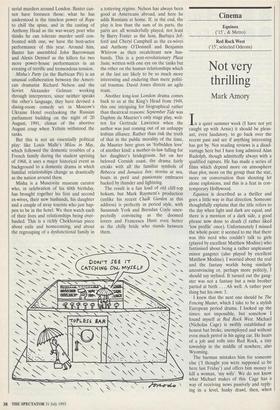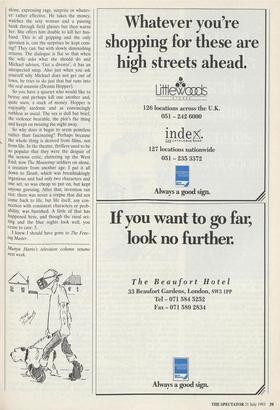Cinema
Equinox (`15', & Metro) Red Rock West (`15', selected Odeons)
Not very thrilling
Mark Amory
In a quiet summer week (I have not yet caught up with Arnie) it should be pleas- ant, even laudatory, to go back over the recent past and see if anything interesting has got by. Not reading reviews is a disad- vantage here but I have long admired Alan Rudolph, though admittedly always with a qualified rapture. He has made a series of films which depend more on atmosphere than plot, more on the group than the star, more on conversation than shouting let alone explosions, and this is a feat in con- temporary Hollywood.
Equinox is described as a thriller and goes a little way in that direction. Someone thoughtfully explains that the title refers to the day when light and dark are equal, and there is a mention of a dark side, a good phrase now done to death (I rather liked low profile' once). Unfortunately I missed the whole point: it seemed to me that there was this nerd who couldn't talk to girls (played by excellent Matthew Modine) who fantasised about being a rather unpleasant minor gangster (also played by excellent Matthew Modine). I worried about the real and the fantasy worlds being similarly unconvincing or, perhaps more politely, I should say stylised. It turned out the gang- ster was not a fantasy but a twin brother parted at birth . . . Ah well. A rather poor thing but his own: 3.
I knew that the next one should be The Fencing Master, which I take to be a stylish European period drama. I looked up the times: not impossible, but somehow I found myself at Red Rock West. Michael (Nicholas Cage) is swiftly established as honest but broke, unemployed and without even much petrol in his aging car. He hears of a job and rolls into Red Rock, a tiny township in the middle of nowhere, also Wyoming. , The barman mistakes him for someone else (`I thought you were supposed to be here last Friday') and offers him money to kill a woman, 'my wife'. We do not know what Michael makes of this. Cage has a way of receiving news passively and reply- ing in a level, husky drawl, then, when alone, expressing rage, surprise or whatev- er: rather effective. He takes the money, watches the sexy woman and a passing hunk through field glasses but then warns her. She offers him double to kill her hus- band. This is all gripping and the only question is, can the surprises be kept com- ing? They can, but with slowly diminishing returns. The dialogue is flat so that when the wife asks what she should do and Michael advises, 'Get a divorce', it has an unexpected snap. Also just when you ask yourself why Michael does not get out of town, he tries to do just that but runs into the real assassin (Dennis Hopper).
So you have a quartet who would like to betray and perhaps kill one another and, quite soon, a stack of money. Hopper is enjoyably sardonic and as convincingly ruthless as usual. The sex is dull but brief, the violence bearable, the plot's the thing and keeps on twisting the night away.
So why does it begin to seem pointless rather than fascinating? Perhaps because the whole thing is derived from films, not from life. In the theatre, thrillers used to be so popular that they were the despair of the serious critic, cluttering up the West End; now The Mousetrap soldiers on alone, a creature from another age. I put it all down to Sleuth, which was breathtakingly Ingenious and had only two characters and one set, so was cheap to put on, but kept anyone guessing. After that, invention ran riot: there was never a corpse that did not come back to life, but life itself, any con- nection with consistent characters or prob- ability, was banished. A little of that has happened here, and though the rural set- ting and the blue nights look well, you cease to care: 5.



















































 Previous page
Previous page